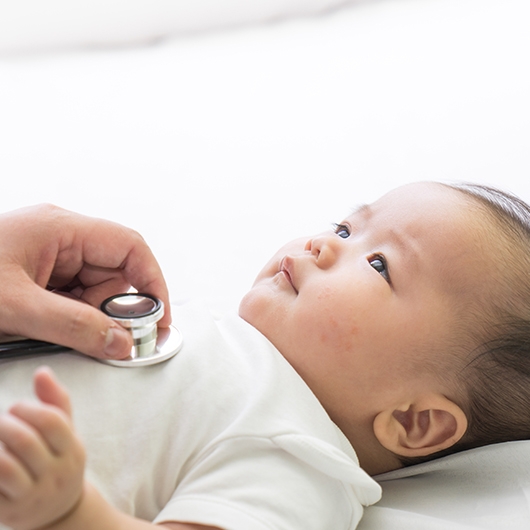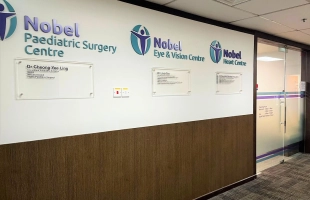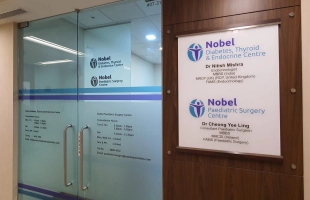Paediatric Surgery for Infants, Children and Adolescents in Singapore
Paediatric Surgery is a specialized field of surgery focused on diagnosing, treating, and managing surgical conditions in infants, children, and adolescents. Unlike general surgery, paediatric surgery requires expertise in handling the unique anatomical, physiological, and developmental differences in children.
At Nobel Paediatric Surgery Centre, our paediatric surgeon, Dr Cheong Yee Ling, provides personalised surgical care for your child. Specialising in surgical procedures from newborns to adolescents, she treats and operate on a wide variety of paediatric conditions with a comprehensive range of procedures and diagnostics.
Dr Cheong Yee Ling currently practices at Nobel Paediatric Surgery Centre Gleneagles Hospital and Mount Elizabeth Novena
Schedule a Paediatric Surgery ConsultationOur Paediatric Surgical Services

We manage various surgical conditions for children and adolescents including:
- General Paediatric Surgery (Circumcision, Tongue Tie, Laceration, Umbilical Granuloma)
- Thoracic (Recurrent pneumothorax, Empyema/Pneumonia Complications)
- Abdomen (Appendicitis, Abdominal Pain, Constipation)
- Pelvis (Ovarian Cysts, Imperforate Hymen)
- Urology (Hydronephrosis, Hypospadias)
- Neonatal and Congenital Surgical Conditions (Congenital Diaphragmatic Gernia, Gastroschisis)
- Inguinoscrotal Conditions (Hernia, Hydrocele, Undescended Testis)

Dr Cheong Yee Ling
Dr. Cheong Yee Ling is a Consultant Paediatric Surgeon who loves working with children and is dedicated to their well-being. She treats a wide range of surgical conditions with precision and care, offering minimally invasive surgeries (MIS) for faster recovery and less discomfort.
Passionate about bringing smiles back to children and parents, she also researches safer, more effective treatments—because every child deserves the best care in the safest hands.
Her greatest reward? Seeing happy, healthy kids back to their playful selves. Because for her, every child deserves the safest hands and the warmest heart in their journey to recovery. ?
More About Dr CheongWhen Should I Consult a Paediatric Surgeon?
If you notice a lump or swelling on your child’s body, it may require medical attention. Common causes include:
- Hernias – A bulge in the groin (inguinal hernia) or belly button (umbilical hernia) may need surgical repair if it persists or grows.
- Cysts or lipomas – Benign lumps under the skin may need removal if they enlarge, cause discomfort, or get infected.
- Lymph node swelling – If persistent or growing, it may require further investigation.
When to see a paediatric surgeon: If a lump is growing, painful, infected, or affecting movement, a specialist evaluation is recommended.
Children may experience sudden or chronic abdominal pain, which may sometimes require surgery. Possible causes include:
- Appendicitis – Sudden severe pain on the lower right side of the abdomen, often with vomiting or fever, may indicate an inflamed appendix that needs removal.
- Hernias – If an abdominal or groin hernia becomes painful or swollen, surgery may be needed to prevent complications.
- Bowel obstruction – Persistent vomiting, bloating, or inability to pass stool could indicate an intestinal blockage.
When to see a paediatric surgeon: If your child has severe, persistent, or worsening abdominal pain, immediate medical attention is crucial.
Some birth-related penile conditions may require surgical correction for normal function and appearance. Common conditions include:
- Hypospadias – A condition where the urethral opening is not at the tip of the penis, affecting urination.
- Buried or hidden penis – When the penis is partially hidden under the skin due to abnormal development.
When to see a paediatric surgeon: If your child has a structural issue affecting urination or appearance, early consultation (usually within the first year) is advised for the best surgical outcomes.
If your child experiences frequent redness, swelling, or infections of the foreskin, it may indicate:
- Phimosis – A tight foreskin that does not retract properly, leading to infections or difficulty urinating.
- Balanitis – Inflammation of the foreskin and head of the penis, often causing pain and discomfort.
When to see a paediatric surgeon: If your child has repeated infections, difficulty urinating, or pain, circumcision or other surgical interventions may be considered.
Sudden testicular or scrotal pain in boys is a medical emergency and should be evaluated immediately. Possible causes include:
- Testicular torsion – A twisted testicle that cuts off blood flow, requiring urgent surgery.
- Torsion of the appendix testis – A less severe but painful condition that may need medical evaluation.
- Inguinal hernia complications – If a hernia extends into the scrotum, it may cause pain and require surgical repair.
When to see a paediatric surgeon: Immediate medical attention is required for sudden, severe scrotal pain to rule out serious conditions like testicular torsion.
Although ovarian cysts are common in girls and teens, some may require surgical removal if they:
- Cause severe pain
- Are large and persistent
- Twist (ovarian torsion) – Cutting off blood supply, leading to sharp abdominal pain and nausea
When to see a paediatric surgeon: If your daughter has persistent or severe pelvic pain, nausea, or bloating, an ultrasound and surgical evaluation may be needed.
If your child has difficulty urinating, recurrent urinary tract infections (UTIs), or abnormal urinary patterns, a surgical evaluation may be necessary. Common conditions include:
- Vesicoureteral reflux (VUR) – A condition where urine flows backward from the bladder to the kidneys, leading to repeated infections.
- Urethral strictures – Narrowing of the urethra causing difficulty in urination.
- Neurogenic bladder – Issues with bladder control due to nerve problems.
When to see a paediatric surgeon: If your child has recurrent UTIs, difficulty urinating, or incontinence despite toilet training, further evaluation is recommended.







